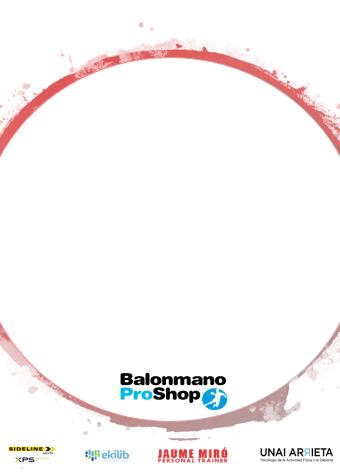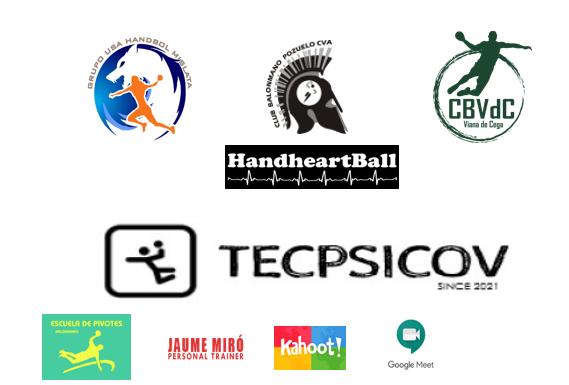
25 minute read
GOAL: Patricia Encinas
task 1 – GOAL
PATRICIA ENCINAS GUARDADO
Advertisement
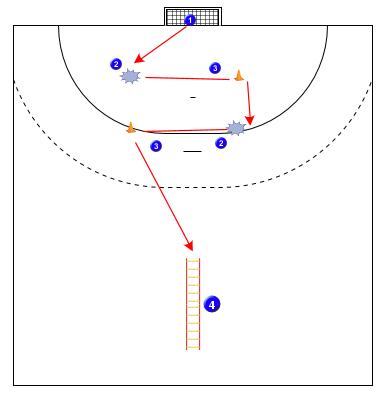
DESCRIPTION

ONE. - According to the exposed scheme, they start from the initial position (goal line) with a movement gesture to be in tension. TWO. - From the initial position they make lateral steps until they reach the bosu, from the bosu they jump with feet together and in the air they make a half-height gesture. THREE. - When they finish exercise TWO, they move in small lateral steps and a little before reaching the cone they have to make a downward stop gesture, the hand pulls the cone. FOUR. - To finish I place myself in front of the stairs to work on different coordination exercises.

TASK 2 – GOAL
PATRICIA ENCINAS GUARDADO
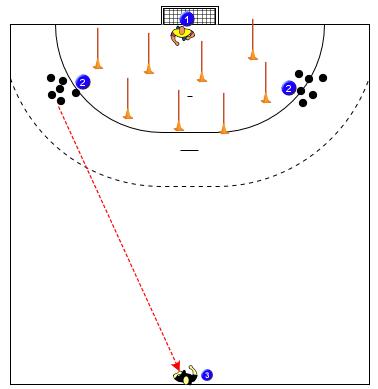
DESCRIPTION
ONE. - From the starting position we will make small lateral steps from one stick to another, as fast as possible. TWO. - When there is a whistle we go for a ball and in this way we work on the counterattack, after giving the counter-attack pass we go down with our backs to touch a stick and go back for another ball to make another pass.


TASK 3 – GOAL
PATRICIA ENCINAS GUARDADO

DESCRIPTION
ONE. - From the starting position we will make small lateral steps from one stick to another, as fast as possible. TWO. - When there is a whistle we go for a ball and in this way we work on the counterattack, after giving the counter-attack pass we go down with our backs to touch a stick and go back for another ball to make another pass.

EL BAR BALONMANO
El Bar Balonmano; yours, ours, everybody's...
An atypical year, a year with little contact with balls and pitches, far from our affections, and even more so, from the cry of the goal that seals a victory. This is what 2020 looked like, with our heads down and our illusions shattered. But let's put an end to so much nostalgia, and start to see the "glass half full" and not the "glass half empty"; in the midst of so much storm, a possibility appears...
"Let's get together and chat via ZOOM!", "I'll share a screen with you and you can see a little something"; we could add thousands of phrases that are now commonplace, but were new even for the world of handball. Yes, "world", because the lovers of this beautiful sport are scattered but united by the same objective: to make our sport grow.
So it was that at the end of March Agustín Bou (Argentinean coach, now in Norway) began to give several talks, along with other coaches - it is worth mentioning Gerard Gomis, who from now on will be Gerard , where coaches mostly from Argentina met through Zoom to listen, exchange and discuss knowledge of the 40x20.
Between so many exchanges, greetings and relaxed chats after the formal parts, these coaches were chatting about life, their current pandemic and many other things. As another saying goes, "God creates them and the wind blows them all together", here we were all piled up by virtuality and maintaining the distance of 2mts (today known by instances of COVID19).
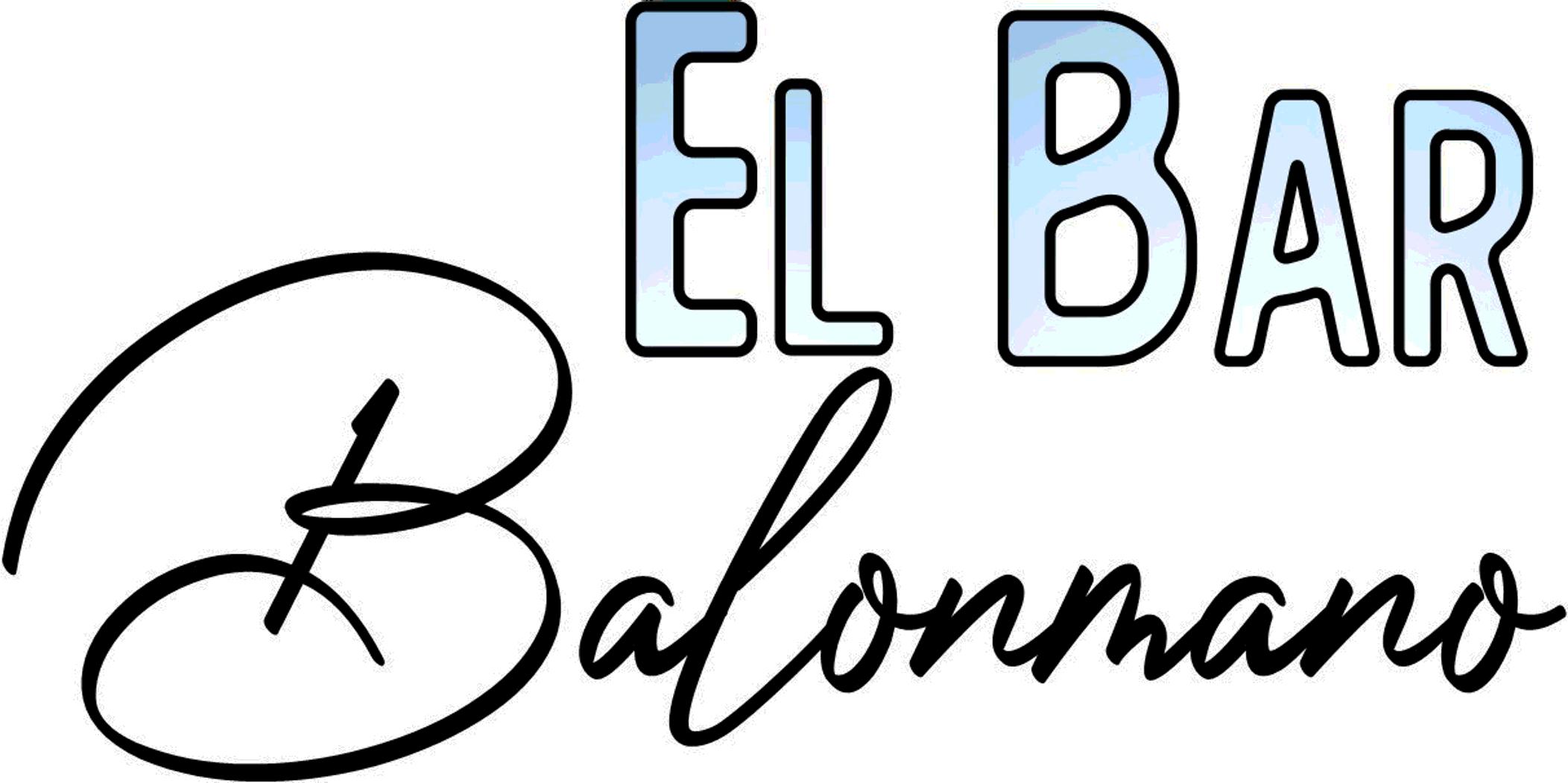
"This looks like a bar, we are talking about something that has nothing to do with the chat", "here I get much more productive knowledge" and so on, phrases that resounded from faces that by now were already familiar. Known through a screen and now contacted by a Whats App group. This was the beginning, the start, the start of something "that got out of hand".
After we were already formed, as a group of experienced trainers, young and inexperienced, the cordiality flowed and the doubts began to clear. So it was that one of our members said to another "why don't you make a book with all the material", the second one had taken almost textual notes of exercise workshops and had a compilation of more than 150, made by Agustín and Gerard.


In this way, he began to produce a single document, where he also added - by way of authorisation - editorials from the authors of the workshops and with this came the first publication of "Ediciones El Bar Balonmano"; in less than 9 months, it had 2,000 downloads in more than 28 countries around the world, a document that came about to share what had already been done with people who had not been able to participate, and ended up being a total change of orbit, putting us in a place we did not know we were in.
After the world revolution, we had to take our place and not shrink in the face of so much exposure, our obligation: to disseminate and share handball. With the editing group (four of the more than fifteen people that make up El Bar), we look for free initiatives to reach different places, as well as some low-cost fee-based initiatives so that anyone who is passionate about handball can continue their training through technology.
Continuing with our life we have also transcribed and edited, in book-digital form, the book "The Imperfect Defence" by Gerard Gomis.
Why this book? When we look back, all of us in charge of its edition agree on the following. Of all the talks, conferences and training given at the beginning of the pandemic, one in particular stood out above the rest. A conference that Gerard gave on defensive systems in training stages. All of us at ElBar Handball felt that, in one way or another, this talk made a difference.
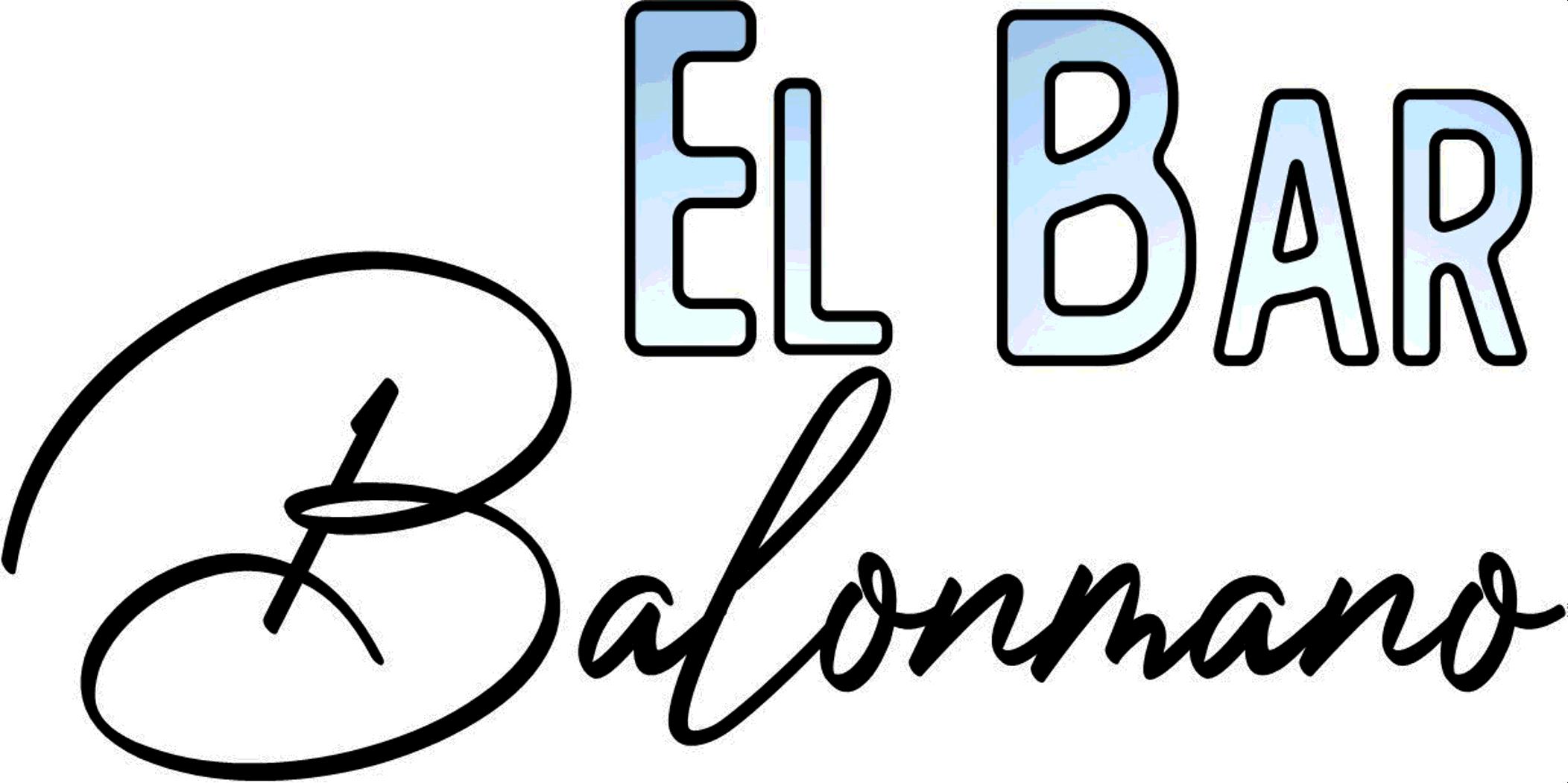

Even a certain nostalgia can be sensed when reading these words, and they would not be very wrong to think that it marked us; so much so that some of us repeated the conference more than once in seven days. And some of us "sick" three times... (we had no choice but to say that "these people were infected", and that we were not at all worried about the possibility of these contagions increasing).
We could go on listing reasons, but the ones already given were more than enough to make us decide to put it on paper, or rather "on the screen", in this case. Like many of our initiatives, this book is free to download and with several links open for small financial donations (although we dedicate many hours to ElBar, practically none of the staff in the group is "dedicated exclusively to this", so help is always welcome). You can access the book from our social networks and it should be said that it logically emphasises all the "open" defensive systems that can be used when training at grassroots level; and we recommend that you take a look at it when you can. Not because we wrote it; but because we are convinced that it is meant to help you. Because of the content, or because of the ideas, or even because of the originality in which these ideas try to be conveyed.
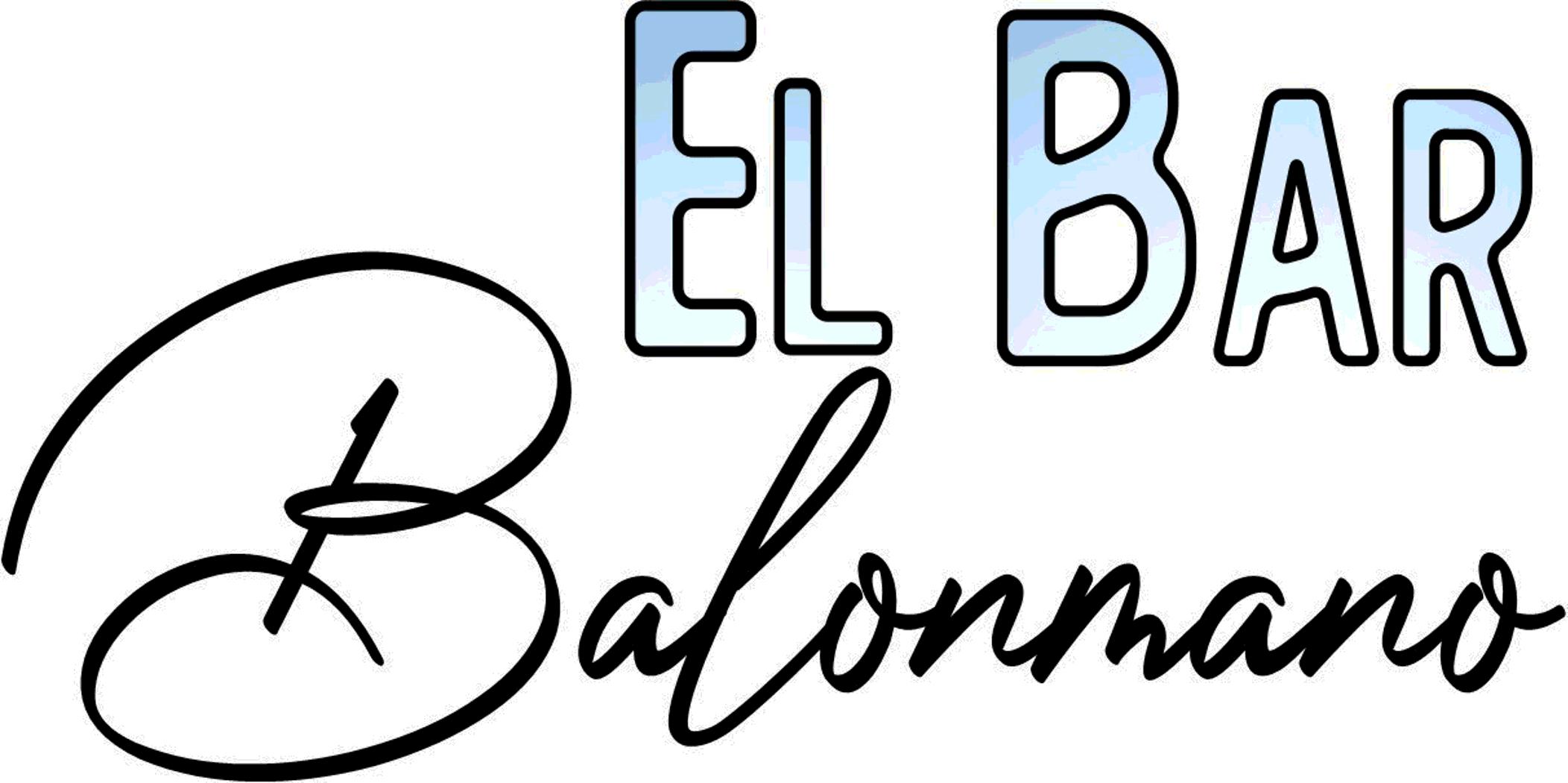
Do you know what is the most important thing about this "crazy" work? That everything, but absolutely everything, is made by people like you. With the same passion, with the same desire to work and want to grow. Crazy self-taught people, people who are not only a sum of successes, but also a great accumulation of mistakes: a typical result of what they call learning, or "wanting to grow". And believe us when we tell you that, if we were able to share with so many people, from so many places, and in such a short time, you too!

http://linktr.ee/ElBarBalonmano
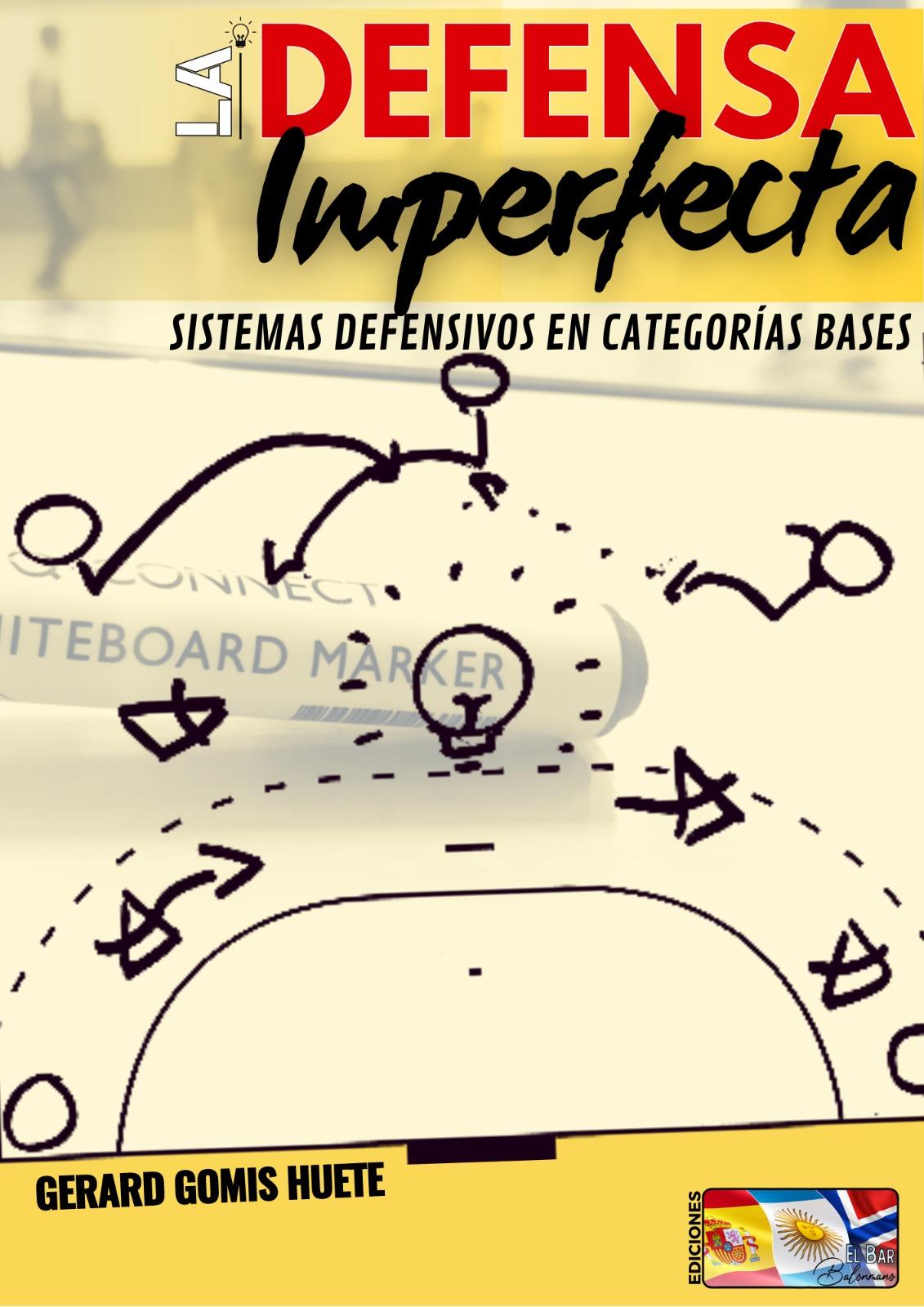

TASK 1 – GOALKEEPER
PATRICIA ENCINAS GUARDADO
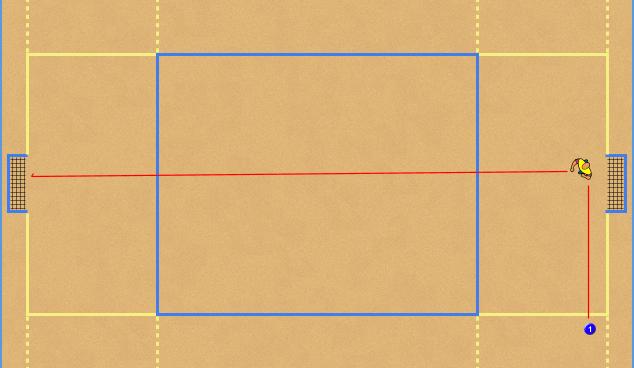
DESCRIPTION
Throwing from goal to goal, where on this occasion we work on the exit of the goalkeeper's goal, the goalkeeper's objective is to run at maximum speed to stop the ball. There is no handball-style save gesture as we are working on the goalkeeper's quick exit and thus stretching as much as possible to be able to stop the ball.


TASK 2 – GOALKEEPER
PATRICIA ENCINAS GUARDADO
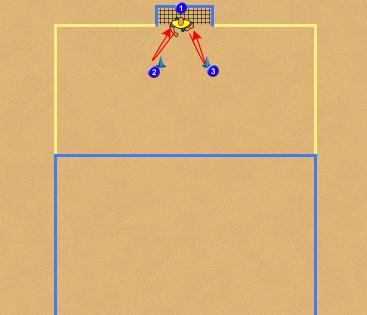
DESCRIPTION
Because you sink in the sand, we work on V-shaped displacements to work on stability during the displacements. Starting from initial position (ONE) to position (TWO) and position (THREE).


TASK 3 – GOALKEEPER
PATRICIA ENCINAS GUARDADO
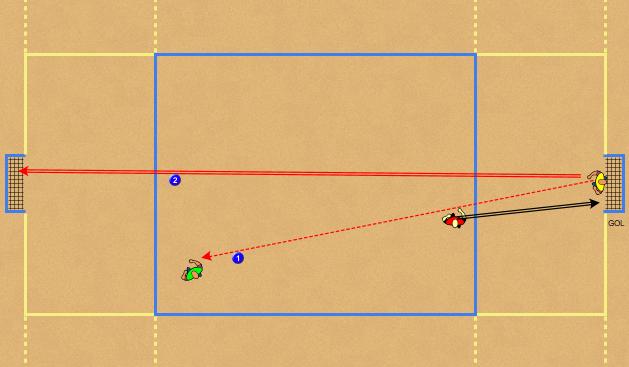
DESCRIPTION
The next exercise consists of the goalkeeper who acts has to be in tension, the objective of the player is to score a goal in front of the goalkeeper, then the goalkeeper has to go as fast as possible to make the first counter-attack pass or the second option from goal to goal.

Lara González. Player of the Club ESBF BESANÇON
H. -What do you remember from your sporting beginnings?
LG. -My family is very sporty, my father is a physical education teacher, he has always practiced a lot of sport and has been involved with sport and sports schools in Santa Pola (Alicante), being the main reason since I was very young that I have lived with my father in reference to sport and physical exercise, for such reasons I have practiced since I was a little girl different types of sport, I started with gymnastics, I also practiced tennis and handball came a little later, it was around 11 years old when I started playing handball. At school, the physical education classes, the classmates, the sports schools, it was at that time that I started, in fact, in the summer sports schools, in the camps, I didn't only go to the handball camps, I also went to the basketball or beach sports camps, in short, in my family we have lived a lot of sport in all senses of the word.
H. -Who come to your mind as the people who marked you at that time?
LG. -Mostly my family, especially my father and my sister too because she played handball before me as did my father and that was a reason why I also decided to take up handball. Other people who also marked me were my teammates, because what made me get hooked on the sport without any doubt were my teammates, my friends, in the end they are the friends I still have today and we started playing since we were very young creating a very good atmosphere and mainly Nuria, above all.

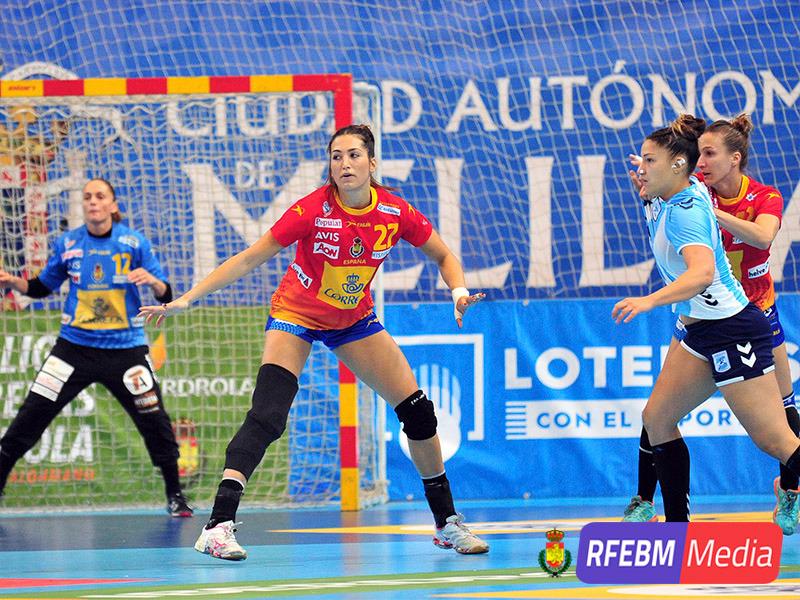
Lara González. Player of the Club ESBF BESANÇON
H. - Why did you choose this sport and not another one?
LG. As I said before, I used to practice gymnastics, tennis and handball, but between English classes and school, I didn't have enough time to do all the activities, so I had to decide and I started to give up activities, the first thing I gave up was gymnastics, but I chose handball because I was looking forward to Monday, Wednesday and Friday of that week to be able to practice it, It made me realise that I liked it very much and when I chose it completely was when I entered at the age of 13 years old as a boarder in Cheste, a High Performance Centre in Valencia, where I spent two years, in that period you have an exclusive dedication to handball, in addition to studying, you intensify training every day, even doubling the training, different situation from when I trained in Santa Pola that were only three days a week, that was really what made me specialise in handball.
H. -Can you combine high performance sport with studies?
LG. -Of course you can combine high performance sport with studies, but it is clear that it is a sacrifice, and perhaps, personally all my younger years I have combined it, it is clear that it is a sacrifice, because you travel, you have to combine studies with handball, the weekend you want to go out, you can not because you have to study, you have to change exams because you can not attend and then do it, so it is clear that it is hard, but of course you can combine it.
For example, in my case for the subject of the degree, I have taken it differently, the rhythm is clear that the availability of time is not the same, so you take it differently, and instead of doing ten subjects in one year, you do five in one year, you go slower, but the objective is not to give it up and to finish.
H. -What advice would you give to a player who is in training and is passionate about handball?
LG. - My advice to a player who is in training and who is passionate about handball, I would say mainly to enjoy, to enjoy the experiences with friends, personally I have very good memories of my training period for the trips we made, where in the end you have very good anecdotes and above all enjoy it and no pressure or take it too seriously, especially enjoy that stage of training.
H. -Is it hard to leave your family, your home and your country to go to another country to pursue your professional career?
L. -Yes, I had the opportunity to go to Metz when I was 20 years old, it is clear that at that stage of change it is a mixture of feelings, of discovery, of living a new adventure, change of country, change of culture, having on the one hand the excitement of a new adventure, pursuing your dream, of finally being able to dedicate yourself to your passion professionally, but on the other hand it is clear that you leave your family, your friends, you go far away, alone, it is clear that it is the hardest thing and what you miss the most. At the moment, I've been abroad for nine years and I can tell you that you never get used to being far away from your family and friends.

Lara González. Player of the Club ESBF BESANÇON
H. -From your time abroad in France, Hungary, Denmark and now France again, what has it given you as a person and as a professional player?
LG. -As I said, I have been abroad for nine years, I spent three years in France, then one in Hungary, two in Denmark and now again in France, but the fact of having left home, with the change of culture, of country, has allowed me to mature, to know, I think that when you travel and live with people from different countries, you experience the different culture, their way of understanding, which allows you to open your mind and have a different vision, as well as travelling.
H. -Another important point for a highperformance athlete is self-esteem and the team atmosphere. How are these two parameters in your club and in the Spanish national team?
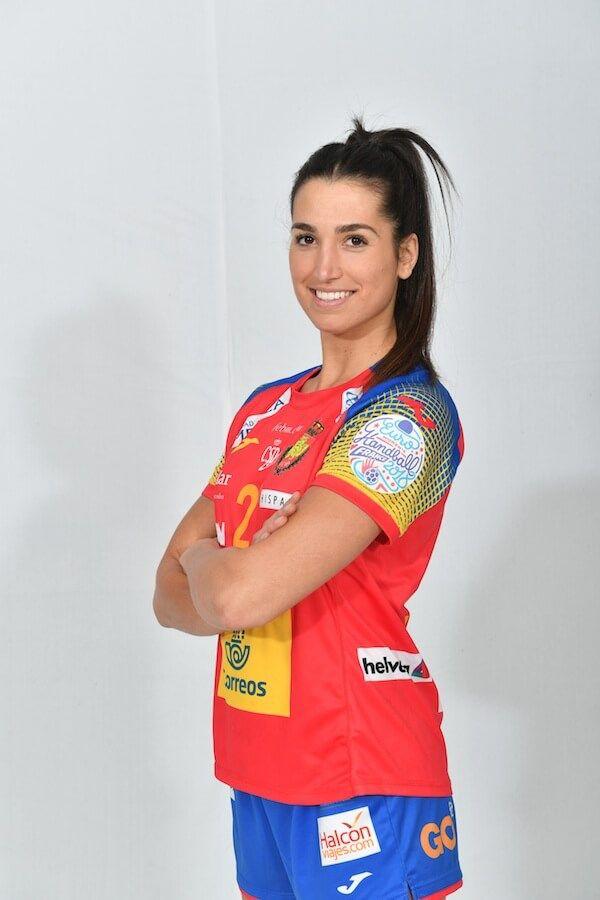
LG. -In reference to the atmosphere in the team is very good and in the Spanish national team too, even more, in a team it is very important that there is a very good atmosphere, being important as in any area of life, being important to understand well with people, with whom you have to live and work, day by day and side by side, achieving a good atmosphere in the team and in the selection is a pleasure and a pride, attending each concentration and always wanting to get together again.
H. -Many of us know you, what advice would you give to a player in training and in offensive tasks?
LG. -In the training of children the main thing is that they have fun and above all to listen to everything the coach says, in defensive aspects, to carry out the defensive retreat well (total that we have finished the attack, loss of ball), as well as having a good direct control of the opponent, as well as knowing how to determine when we have to help our teammates and when not, being very forceful in those aids.
H. - In the mental and psychological preparation field, what is the most important thing for an athlete of your level?
LG. -Before, not so much importance was given to the psychological aspect, the mental aspect, and I think it is very important, just as we train physically, train technique, tactics, analyse videos, eat well, rest, psychological work plays a very important role.

Lara González. Player of the Club ESBF BESANÇON
It is true that I had never worked on it, until a couple of years ago, when I saw that it was necessary, that I was not in a good moment, considering that I had to work on that facet with a sports psychologist, highlighting that it was very good for me, in fact, I have used it at different times and it has always been positive. Considering that it is one of the forgotten fields, that psychological part has a determining value, being important to work much more on it.
The most important thing being the control of emotions, in the end being able to be capable in a match and during the course of a match where you experience a lot of emotions, moments where you miss something, where you meet the public, the referees, the opponents, where there are many external factors that influence you, where I believe that if you are able to control these emotions, to control frustration because during the match there are many moments, and the main key is to be able to work on them.
H. - In the nutritional field, do you think that nutrition brings added value to performance inthe elite?
LG. -Effectively all the fields are important to work on, as I said, physical, technical, tactical, psychological, nutrition, all of them we have to give them their space and among them nutrition, which can give you that little extra, to be able to recover much better, to have enough energy, but mainly to be able to recover.
H. - Apart fromhandball, doyouhave any hobbies?
LG. -I have done physical activity sciences in sport, so I like sport in general, for example, the day I stop handball, I will continue practising other types of sport for sure, other hobbies that I have, for example watching series,................
H. -What has been your greatest sporting triumph and what do you remember about it?
LG. -The silver medal at the 2019 World Championships, it was a very good championship and above all how we enjoyed it and how we lived it, for me it was something very nice.
H. -Howdoyoucope withbecominga mediastar and anidol for the girls?
LG. -In terms of becoming a media star, that is quite far away, but what I think is important is that the girls, who are starting to get started in handball in particular, can have references, being very important that we players are their references, all of us who are at the top level, where they can see those mirrors where they can look at themselves being one of the most beautiful aspects, where we try to be as close as possible to them, for example: When we go with the national team right now, not because of covid, but in previous years when we have gone to schools, the welcome we have received, when we go to any city we go to, it is incredible and when you feel the warmth that the little ones give you, it is an incredible satisfaction.
H. -To those girls who play handball, who are fans of the Warriors and are starting to play handball, making their small contribution to women's sport, do you think that women's sport is valued in Spain as men's sport is and that we should contribute to its growth?
LG. - Efforts are being made, but the difference between women's sport and men's sport is notorious, it is very big nowadays, but I think we must continue working through the support of institutions, through media visibility, communication, in the end there is a big difference and I think that greater support for women's sport is necessary.

H. -That you remember of your sport beginnings?
Jota Hombrados. -Then mainly the teammates and the truth are that the patrimony that leaves the handball you is the friends with whom joint parties equipment, it is not easy to follow in contact after so many years but the truth is that it is a joy when you return to remember those moments of the beginnings
Hho comes you to the memory like the people who marked to you then?
JH. -Sincerely many but mainly Ernesto Enríquez, Pedro Pablo (trainers and professor of School SAFA), and all my friends of the school, soon when it arrives at the first equipment from the Athletic one from Madrid, Juan de Dios, Cecilio Alonso, Claudio Gomez, Tomas Svensson, were people who marked my first time in the elite
H. -Were you clear about being a goalkeeper from the beginning?
JH. -Yes, at no time did I consider being a field player, then later I thought I could have tried but the reality is that I never got to participate as a player. I liked being a goalkeeper and at that time there weren't many people who wanted to be.
H. -What is it that encourages you to stay active?
JH. -Well, I don't exactly need to be encouraged, I like it so much that I enjoy it a lot, although obviously not everything is to enjoy, there is still more joy, enjoyment and passion than suffering that is why I keep playing and of course, because my physique still allows me to be more or less able to perform.
H. -¿What advice would you say to a player who is in training and who is passionate about handball?
JH. -Well, keep that passion and think about nothing else, enjoy every day without thinking about much more than playing the next game, when you want to realize it, 30 years will have passed.
H. -In the mental and psychological preparation field, what is the most important thing to take into account as a goalkeeper?
Being a coach is very difficult, being a friend, father, partner, boss, organizer, psychologist, teacher
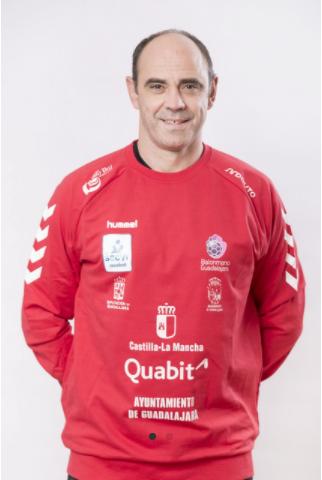
JH. -Confidence is very important, perhaps it is the key, without confidence it is very difficult, of course it is necessary to have personality, to be a leader to a certain extent, but everything that takes away confidence is bad for a goalkeeper because without it, he will not be able to demonstrate what you know, since confidence is a performance amplifier. For all this, goalkeepers have to be mentally strong so that everything external does not diminish their state of natural confidence.
Sometimes we confuse nerves with lack of confidence but it is not, nerves are essential to know that you care about what you do, but always trusting in your work.

H. -The new rules of the Game, such as the Goalkeeper Player Change, have demanded even greater physical preparation from goalkeepers. How do you assess this type of rules?
JH. -Not really, goalkeepers have been examples of physical preparation for years and today they prepare like any other member of the squad. For me it is a rule that will end up changing because the teams are going to execute it better and better and I think it favors the team that has the most exclusions, something that is detrimental to the one that does things well.
H. - Besides handball, do you have any other hobbies?
JH. -The truth is that my schedule leaves me little time and I can't do many things, I really like motorcycles, but now I can't, I don't have time to go out on the road. I would also like to have time to read more because in the end and a short time only allows me to watch sports and movies on television.
H. -We know your career has been very successful, with great triumphs, but if you had to choose one in particular, what would it be? Why?
JH. -It is true, it is not easy to stay with a specific title, but I think that the 2005 World Championship is the title that summarizes everything in short, a global photo of my career. It was a spectacular year both with the Bm team. Ciudad Real, as with the National Team, my son Javier was also born, in short a year to frame.
H. -About the World Cup in Egypt, how would you assess the preparation of the teams due to Covid? And the performance of the goalkeepers as you have seen it? Are there any that you think have stood out above the rest?
JH. -The preparation of the teams has not been easy at all, the majority of previous events and tournaments have been canceled due to difficulties when organizing trips, but it is a special year for everything, it is the first time that a world championship and some olympic games in the same year, this is going to mean repeating in a way a very similar event in 6 months.
Regarding the level of the goalkeepers, at the moment we are in figures similar to other championships. I was surprised, Moraswski and goalkeeper Frances Wesley Pardin, of course because they are not usual, but I think we have to wait until the first phase is finished to see that goalkeepers are being protagonists and are helping their teams, I think that in this sense Spain has a very balanced goal that is working perfectly.
H. -We know you've had many coaches, and we don't want you to name them, but all of them, which is what you've valued the most from them, as a player.
JH. -What I can tell you is that I have learned from everyone, and this is the most important thing, they are all good for something, sometimes a priori you are conditioned because you liked the previous coach a lot or because you had more confidence with him but over time I have learned to take the best of each one and to know how to take advantage of it.
For me being a coach is very difficult, being a friend, father, partner, boss, organizer, psychologist, teacher, makes being a coach very complex, so doing all this and also doing it with 16-20 different people is still a challenge. higher. For me deep down they are heroes and on many occasions they are the least protagonists. P
I think that with this I tell you everything, for me they have a lot of value.

Esteban Alonso Coach of the U14-16 - Youth and Senior B (Serie B) categories at the Pallamano Molteno Club - Lombardy, Italy.
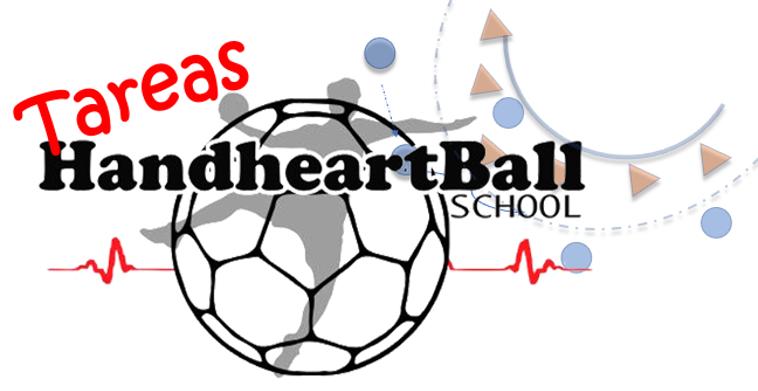
Phase : Attack
2x1 with decision making. Start A/C-E relationship. (10min) 2 rows of Pivots - 2 rows of wings and 2 defenders. E always starts with ball in hand. 1- E passes to A, who will receive the ball moving towards the centre. 2- At the same moment E moves for 9mts until he reaches C's zone. 3-A passes to C, who receives the ball on the move, opening the game outside the cones (simulating opening space). 4-Simultaneously E enters the game blocking the cone and C changes direction towards the centre. 5-Play 2x1. Resolution based on the defender's action. 5A throw in / 5B pass to E Then starts the Pivot who is in the same area outside the cones. Dynamic exercise, where all players are in constant movement to receive the ball and carry out the task. Maximum concentration to avoid pauses in the exercise. Progression to 3x2 - 5x4 (total complete exercise 20/25min).
2X1 BLOCK 1/4
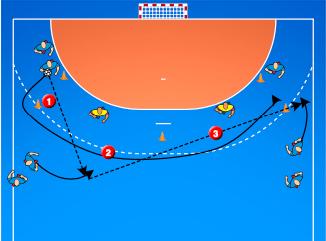
Mov 1-2-3 3/4 2/4
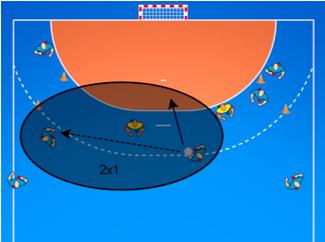
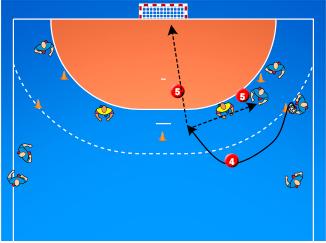
Mov 4-5a-5b
4/4
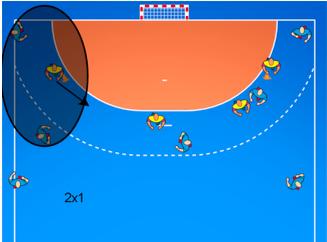
OBJETIVE
• Improve decision making • Improve movement with and without the ball • Improve the trajectories and orientations of the player with and without the ball. • Work on the timing of the pivot's entry into the zone and the change of direction and rhythm of the player with the ball. • To be able to set and release in the shortest possible time.
